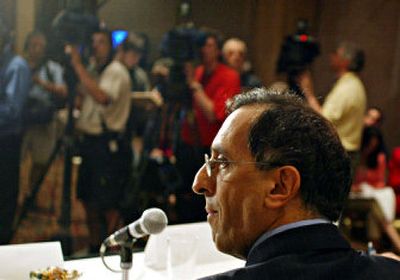Court ends Quebec’s health care monopoly

TORONTO – Canada’s Supreme Court dealt a powerful blow to the state monopoly on health care Thursday, striking down a Quebec ban on private health insurance for services provided under the country’s Medicare system of universal coverage.
Although the unanimous ruling applies only to Quebec, it is sure to bring similar cases in other Canadian provinces and give impetus to a growing movement pushing for public and private care.
Government leaders rushed to defend the current system, and Medicare supporters voiced fears the ruling will bring a two-tiered system favoring those with money and possibly hurting care for the poor. Proponents of change say it will improve care by offering more choices and cut waiting times for treatment.
The Supreme Court said Quebec’s prohibition violated the province’s charter of rights by threatening the lives of patients, and the justices noted other countries have successfully combined private and public care.
“The evidence in this case shows that delays in the public health-care system are widespread, and that, in some serious cases, patients die as a result of waiting lists for public health care,” Chief Justice Beverley McLachlin wrote.
“The evidence also demonstrates that the prohibition against private health insurance and its consequence of denying people vital health care result in physical and psychological suffering … .”
Medicare arose from a 1984 law that affirmed the federal government’s commitment to provide mostly free health care for all, including the more than 200,000 immigrants arriving each year.
Most polls indicate that Canadians support the system despite the high taxes needed to finance health care, seeing it as a marker of egalitarianism and independent identity that sets their country apart from the United States, where some 45 million Americans lack health insurance. But in recent years Medicare has been plagued by long waiting lists and a lack of doctors, nurses and state-of-the-art equipment. Some patients wait months for surgery, MRI machines are scarce and many Canadians travel to the United States for treatment.
Under the Canadian system, it is illegal to seek faster treatment and jump to the head of the line by paying out of pocket for public care. Private health clinics have sprouted up for Canadians willing to spend their own money for treatment. But they are technically illegal, though some provincial governments tend to look the other way, especially for more minor treatments.
Although unanimous in voiding Quebec’s law, the court split 4-4, with one abstention, on whether the ban on private insurance was unconstitutional or violated the federal Charter of Rights and Freedom that guarantees “life, liberty and security of the person.”
Still, the ruling is expected to have a trickle-down effect on the other Canadian provinces that forbid private health insurance.
“This is the end of Medicare as we know it,” said John Williamson of the Canadian Taxpayers Federation. “It’s going to open up litigation across the country in the other nine provinces as taxpayers there press for the same right, which is the right to seek and buy insurance to cover private health care.”
The justices took a year to rule on a case that began in 1997, when George Zeliotis, an elderly Montreal man, tried to pay for hip replacement surgery rather than wait nearly a year for treatment at a public hospital.
Zeliotis told the high court he suffered pain and became addicted to painkillers during the yearlong wait for hip replacement surgery, and should have been allowed to pay for faster service at a private clinic.
His doctor, Jacques Chaoulli, argued his patient’s rights were violated because Quebec couldn’t provide the care he needed, but didn’t offer him the option of getting it privately. Chaoulli also argued doctors should be allowed to open private hospitals if patients are willing to pay.
Prime Minister Paul Martin insisted private health care is not the solution to Medicare’s problems. “We are not going to have a two-tiered health care system in this country. Nobody wants that,” he said. “What we want to do is to strengthen the public health care system. We want to make sure that it is universal and to make sure that we have timely access.”